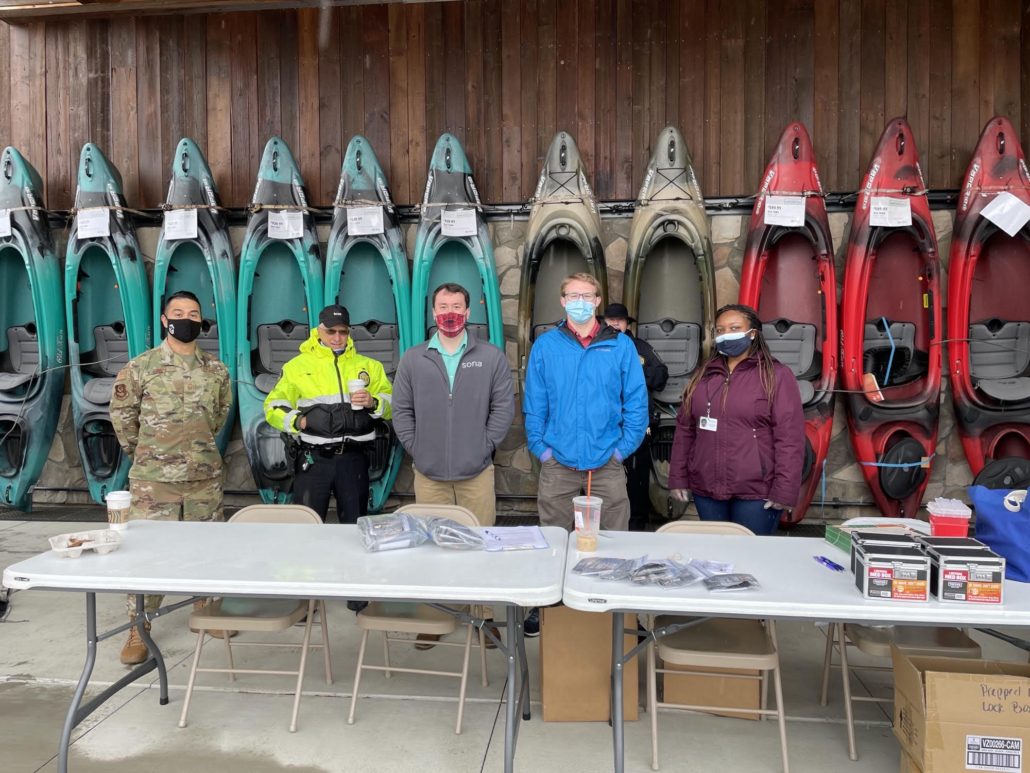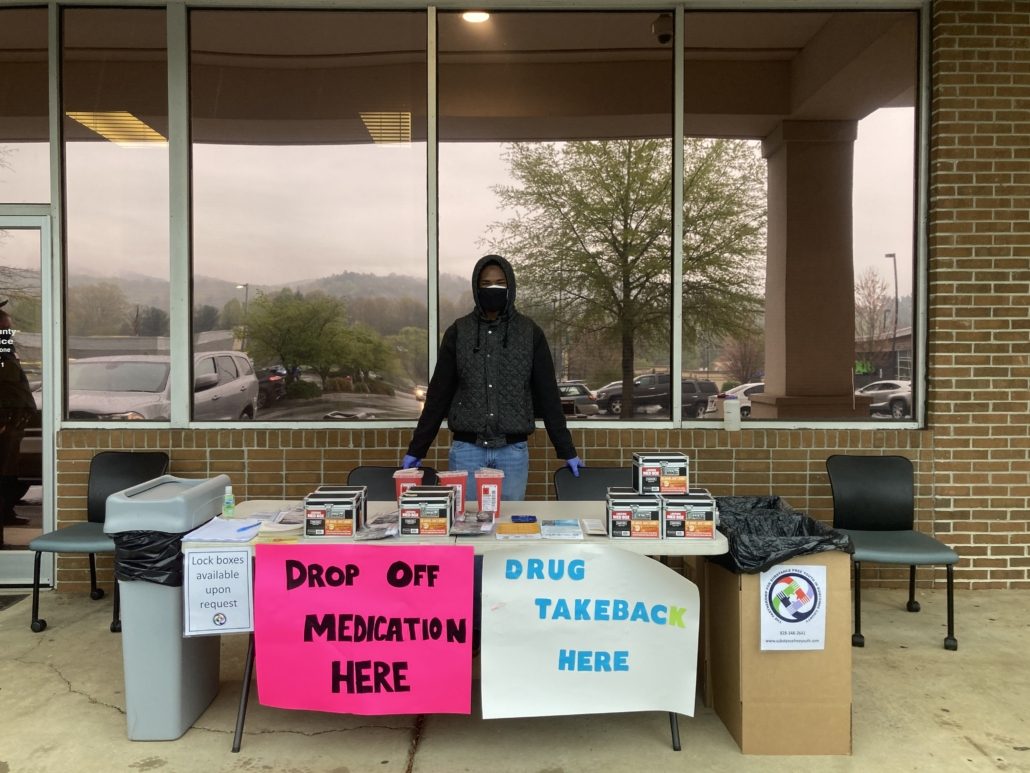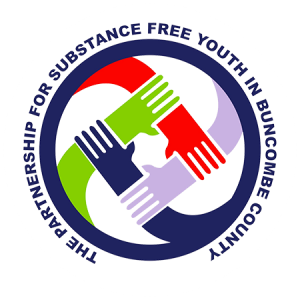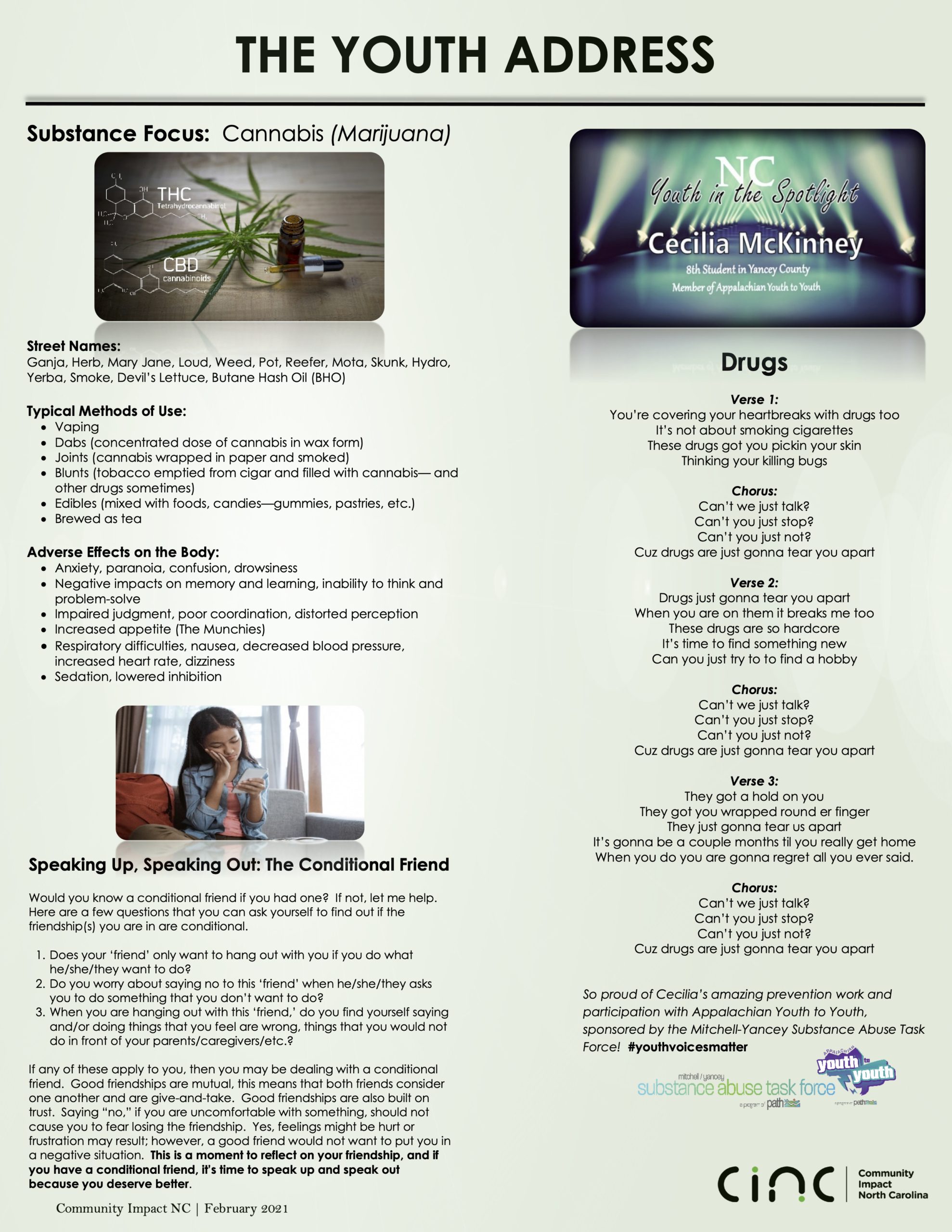A BIG thank you to our incredible volunteers that braved the rain last weekend for our Medication Take-Back at Asheville Outlets and Buncombe County Sheriff’s Office. With your help, we collected 43 lbs. of medication! We distributed 6 lockboxes, 3 sharps containers, and 22 packs of Deterra Drug Deactivation System. If you live in Buncombe County and would like any of these items please send us a message!


 Thank you to our partners that helped get the word out to our community!
Thank you to our partners that helped get the word out to our community!
https://www.buncombecounty.org/governing/depts/Health/news_detail.aspx?id=19291
“While it will take some time for all the data from 2020 to be released, it’s fair to say the opioid crisis is still ongoing in this community. “The reality is that when our social contact is limited, we tend to get sicker, and that sickness shows up as addictive and compulsive behaviors,” added Nicolaisen.”
The Partnership for Substance Free Youth in Buncombe County taking back unwanted prescription drugs April 24
[Asheville, NC] – On Saturday, Apr. 24, from 10 a.m. to 2 p.m. the Partnership for Substance Free Youth will be collaborating with local businesses and law enforcement to provide the public the opportunity to prevent pill abuse and theft by ridding their homes of potentially dangerous expired, unused and unwanted prescription drugs. This year, sites are also accepting electronic e-cigarette devices with batteries removed. Bring your medication for disposal to one of the multiple drop off locations. (Sites cannot accept needles or sharps) The service is free and anonymous, no questions asked.
The event will take place at multiple locations across Buncombe County from 10am-2pm:
- • Asheville Outlets – 800 Brevard Rd
- • Sheriff’s Satellite Office – 339 New Leicester Hwy
To keep everyone safe, collection sites will follow local COVID-19 guidelines and regulations and a drive-through drop-off process will be available.
This initiative addresses a vital public safety and public health issue. Medicines that languish in home cabinets are highly susceptible to diversion, misuse, and abuse. Rates of prescription drug abuse in the United States are alarmingly high, as are the number of accidental poisonings and overdoses due to these drugs.
How to Safely Store Medications
Store medications in secure locations such as:
- • Medication lock box
- • Cabinet with lock
- • Or other lockable spaces
Avoid storage places where children and others can easily access, such as:
- • Drawers
- • Nightstands
- • Or kitchen cabinets
How to Dispose of Medications
Once finished with a medication, you have three options for disposal:
- 1. Safely dispose of medications by placing them in a local drop-box:
- • Lobby of Buncombe Sheriff’s Office – 339 New Leicester Highway, Asheville
- • Lobby of Buncombe County Courthouse – 60 Court Plaza, Asheville
- • Lobby of Asheville Police Department – 100 Court Plaza, Asheville
- • Call your local pharmacy to see if there is a drop box on site
- 2. Take advantage of community drug take-back programs that allow the public to bring unused medications to central locations for proper disposal.
- 3. No drop-box or take back near you? Dispose medications safely at home:
- • Remove pills from bottle and mix them with undesirable substances such as kitty litter or coffee grounds.
- • Throw away the sealed mixture into the trash.
- • Remove the prescription label and dispose of the empty bottle.
For more information about the disposal of prescription drugs or about the April 24 Take Back Day event, go to https://www.substancefreeyouth.com/
An effort to prevent prescription pill abuse in the mountains took place on Saturday, October 24, through a national drug take-back day. The Partnership for Substance Free Youth teamed up with local law enforcement to host the drive-through medicine drop.
https://wlos.com/news/local/drive-through-medication-drop-aims-to-help-save-lives
Buncombe County Government hosted a “Let’s Talk COVID-19” Zoom event. ABFM (Asheville Buncombe Futures Movement) and other high school students shared their experiences during the pandemic.
From stressing out about heavy workloads with little instruction time to how they’re finding support and respite during a school year knocked off the rails by COVID-19, local students talked the ins and outs of life under the virus during a Zoom call hosted by Buncombe County Wednesday.
At the latest edition of Buncombe County Government’s “Let’s Talk COVID-19” virtual town hall series, a handful of area high school students focused on the impact of the pandemic in their lives, sharing their new daily routine, their concerns and their hopes for a world beyond the virus.
Hosted by Zo Mpofu, and human services program consultant with Buncombe County and Buncombe Early College Senior Ben Friedman, the program asked students first what their day-to-day schedules look like under virtual learning.
“I was impressed, humbled and really inspired,” Mpofu said. “I think hearing from the students was really one of the unique moments of hope recently.”
Mission Health hosted an opioid take-back event covering five locations on Saturday, Oct. 24, to raise awareness about the dangers of opioid misuse as well as proper disposal of medications.
As the COVID-19 pandemic continues, the U.S. is seeing an increase in opioid usage, with 40 states reporting increases in opioid-related mortality, according to the American Medical Association.
“Stress related to the COVID-19 pandemic may be exacerbating the opioid crisis by causing many Americans to have feelings of anxiety, grief, isolation, financial worry, and an ongoing sense of uncertainty, affecting those with substance use disorders as well as those at risk of developing one,” said William Hathaway, chief medical officer of the North Carolina Division of HCA Healthcare.
“Now is more important than ever to get unused pain medications out of homes and to educate the community about the serious threat of opioid misuse.”
According to the Centers for Disease Control and Prevention, in 2018, an estimated 2 million people in the U.S. suffered from an opioid use disorder and more than 67,000 Americans died from drug overdoses.
In light of the COVID-19 pandemic, there has been an increasing demand for alcohol delivery and some businesses have been transitioning to delivering alcohol to homes and providing curbside pickup.
A few important things to remember regarding home delivery of alcohol:
- Legal hours of sale in Buncombe County:
- Monday – Saturday: 7:00 am until 2:00 am
- Sunday: 10:00 am until 2:00 am
- Individuals must be 21 to deliver alcohol.
- Individuals making deliveries may not consume alcohol prior to or while working.
- Hard liquor may not be delivered in North Carolina.
- Delivery maximums to an individual:
- Beer: no more than 80 liters (9 cases and a 6-pack or a keg and 3 cases)
- Unfortified wine: no more than 30 liters (10 boxes of wine or 30 bottles)
- Unfortified wine is what is thought of as regular red or white wine and contains less than 16% alcohol.
- Fortified wine: no more than 8 liters (about 8 bottles)
- Fortified wine has distilled spirits added to it and contains over 16% alcohol. For example: port, sherry and vermouth.
- When delivering, make sure to check the ID of the purchaser, making sure it is valid, they are 21 or older, and the person looks the same as the photo on their ID.
- Acceptable forms of ID are:
- NC Driver’s License
- NC ID Card
- Out of State Driver’s License
- Passport
- Military ID
- Acceptable forms of ID are:
- It is illegal to knowingly deliver alcohol to someone that is intoxicated.
- A business and/or its employees can be held liable if it provides alcohol to an underage person or a person who is intoxicated, and that person subsequently injures or kills someone in an automobile accident.
- Any person delivering alcohol may refuse to deliver to anyone, as long as the refusal is not discriminatory.
Visit https://abc.nc.gov/Training/Driver/RegisterUser to register for a free online Responsible Alcohol Delivery Service Permit Training.
Visit our resources page: https://www.substancefreeyouth.com/resources/



